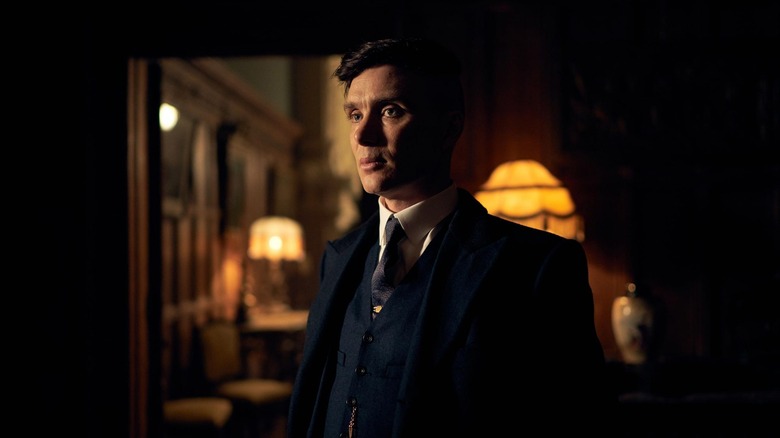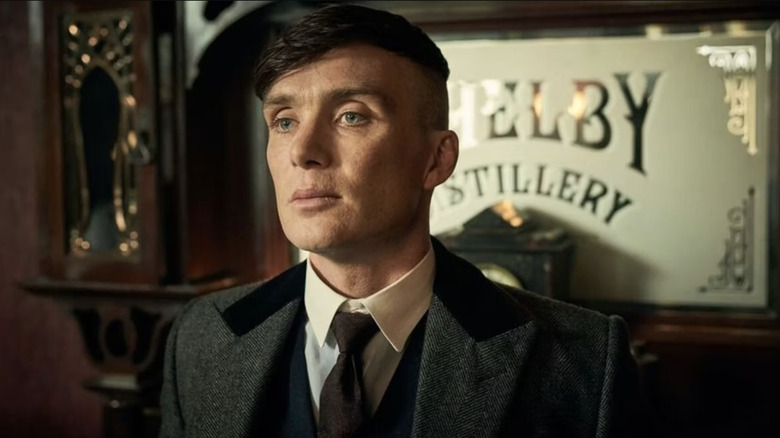Cillian Murphy Had His Doubts About Peaky Blinders' Rock 'N Roll Soundtrack
The opening sequence of the post-war crime drama series "Peaky Blinders" sees its lead — who we'd come to know as crime boss Tommy Shelby but for now, he's just a lone rider — gallop into town on a racing horse. It's 1919 in Birmingham, England, and the crowds that scatter and whisper as Shelby enters the slums make him out to be some formidable hero — an outlaw cowboy of sorts. He visits a fortune-teller who performs a mystic ritual on the horse, compensates her, and announces the horse's name and racing time to the women and children onlookers with the warning, "You ladies have a bet yourselves, but don't tell anyone else." No one is hurt, but all are intimidated.
That's when the apocalyptic bells of Nick Cave and the Bad Seeds' "Red Right Hand" kicks in.
Not the Dixieland jazz that was growing in popularity at the time, nor songs like George Gershwin and Irving Caesar's "Swanee." Despite being a British period crime drama, Steven Knight's BBC/Netflix series is peppered with contemporary hits, diverging from the approach of other concurrent period shows like "Downton Abbey." A run through the show's six seasons conjures up an array of artists and genres from Black Sabbath to Joy Division to The Dubliners, all serving to lionize the Shelbys and associates not as two-bit criminals, but proper outlaws. For Cillian Murphy, who plays the ambitious Shelby, it seemed like a bizarre choice at first. He tells the Belfast Telegraph:
"I have to admit, initially I was like, 'You're putting contemporary music with a period drama?' But it worked, because a lot of the artists had an outlaw quality to them, and that seemed to suit the essence of the show."
The music makes the man
Indeed, the soundtrack choices seamlessly fit along with the stylization and tone of the series. Nick Cave & The Bad Seeds would make their way into more episodes with fitting songs such as "Brother, My Cup Is Empty," amplifying the gritty gangland of post-war Birmingham that was both an industrial boon to wartime England and a hub of struggling war widows and shell-shocked veterans.
Perhaps one of the best examples of fitting jukebox choices would be a somber season 2 scene in which Tommy Shelby dispatches one Eamonn Duggan. Eamonn is an Irishman, one who crosses IRA operative Irene O'Donnell and earns a bullet with his name on it. Tommy finds the doomed man hard at work before a fiery furnace, the sparks flying from his anvil providing much of the light.
The song of choice is one that was around at the time, the Irish ballad "Danny Boy." It has various interpretations but it's generally considered a farewell song, be it sung to a young man going to war or emigrating to another country. This particular version, though, is one sung by Johnny Cash on one of his greatest albums, "American IV: The Man Comes Around." It's an album wrought in the final years of Cash's whirlwind life, and years of living life and earning regrets come through in the grit and tremor in the "Ring of Fire" singer's voice.
You'd be hard-pressed to find a better-suited voice to accompany Shelby, just three years beyond a World War that would haunt him throughout the series. Through Cash, the song becomes a funeral dirge for a man sentenced to die, and a man losing a morsel more of his soul in the execution. As with the entire series, the music would serve to deify all involved.

